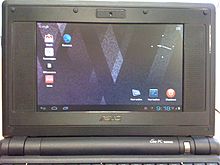Android-x86
This article needs additional citations for verification. (February 2013) |
 | |
| OS family | Android |
|---|---|
| Working state | Active |
| Source model | Open source |
| Latest release | 7.1-r2[1] / May 2, 2018 |
| Latest preview | 8.1-rc1[2] (based on the latest Android Oreo-MR1 release (8.1.0_r33)) / June 18, 2018 |
| Kernel type | Monolithic (modified Linux kernel) |
| License | Apache License 2.0 |
| Official website | www |

Android-x86 is an unofficial initiative to port Google's Android mobile operating system to run on devices powered by AMD and Intel x86 processors, rather than RISC-based ARM chips.[3][4][5][6][7][8]
The project began as a series of patches to the Android source code to enable Android to run on various netbooks, tablets and ultra-mobile PC.
Chih-Wei Huang and Yi Sun originated the project in 2009. Yi Sun then quit due to personal affairs. Chih-Wei Huang is the current project maintainer, that has collaborated with Jide technology (that makes Remix OS), prior to joining that company.
Overview
The OS is based on the Android Open Source Project (AOSP) with some modifications and improvements. Some components are developed by the project which allow it to run on PC architecture. For instance, some low-level components are replaced to better suit the platform, such as the kernel and HALs. The OS enables OpenGL ES hardware acceleration via Mesa if supported GPUs are detected, including Intel GMA, AMD's Radeon, Nvidia's chipsets (Nouveau), VMware (vmwgfx) and QEMU (virgl). Without supported GPUs the OS can also run in non-accelerated mode via software rendering. Since 7.1 the software renderer was implemented via the SwiftShader project.
Like a normal Linux distribution, the project releases prebuilt ISO images which can run under live mode or install to the harddisks of the target devices. Since the 4.4-r2 the project also releases efi_img[9] which could be used to create a live USB which is bootable from UEFI devices. Since 4.4-r4, the UEFI support was united into the ISO images and efi_img was marked as deprecated.
Except AOSP, the following incomplete list of components are developed from scratch or derived from other open source projects to form the entire Android-x86 codebase:
More and more components may be added to the updated version.
Android-IA
A related project, Android-IA[10] has been produced by Intel that will run on newer UEFI devices. The Android-IA project states that its intention is to drive Android support and innovation on Intel Architecture in addition to providing a venue for collaboration.[10] Android-IA re-used the drm_gralloc graphics HAL module from Android-x86 in order to support Intel HD Graphics hardware. The Android-IA project provides a FAQ[11] with more detailed information.
Remix OS
Jide Technologies announced Remix OS, a closed-source derivative of Android-x86 designed for use on conventional PCs, is partnering with Chih-Wei Huang, the main developer of Android-x86. Remix OS's first beta was made available on March 1, 2016. The project was discontinued in July 17, 2017.[12]
See also
References
- ^ "ReleaseNote 7.1-r2 - Android-x86 - Porting Android to x86". Android-x86.org. 2018-05-02. Retrieved 2018-05-02.
- ^ "ReleaseNote 8.1-rc1 - Android-x86 - Porting Android to x86". Android-x86.org. 2018-06-18. Retrieved 2018-06-20.
- ^ DistroWatch Weekly, Issue 767, 11 June 2018
- ^ Android-x86 4.0 review - Not impressed
- ^ Android-x86 4.4 review – first Release Candidate | LinuxBSDos.com
- ^ Android-x86 Just Might Make a Good Linux Desktop Alternative | Reviews | LinuxInsider
- ^ DistroWatch Weekly, Issue 630, 5 October 2015
- ^ DistroWatch Weekly, Issue 682, 10 October 2016
- ^ "Android-x86 Release 4.4". android-x86@sourceforge. Retrieved 31 August 2015.
- ^ a b "Home". Android on Intel Architecture. Retrieved 3 January 2014.
- ^ "FAQ". Android on Intel Architecture. Archived from the original on 31 December 2013. Retrieved 3 January 2014.
{{cite web}}: Unknown parameter|deadurl=ignored (|url-status=suggested) (help) - ^ "[ANNOUNCEMENT] Release of Remix OS for PC Be… | Remix OS". Forum.xda-developers.com. 2016-03-01. Retrieved 2017-05-02.
